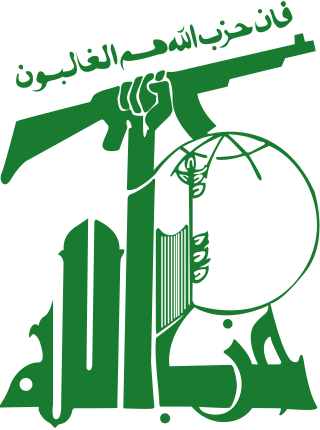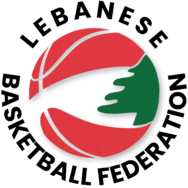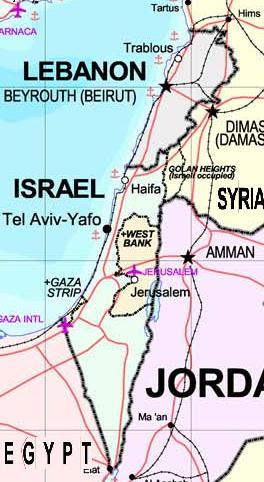
Hezbollah is a Lebanese Shia Islamist political party and militant group, led since 1992 by its Secretary-General Hassan Nasrallah. Hezbollah's paramilitary wing is the Jihad Council, and its political wing is the Loyalty to the Resistance Bloc party in the Lebanese Parliament.

Lebanon, officially the Republic of Lebanon, is a country in the Levant region of West Asia. It is bordered by Syria to the north and east, by Israel to the south, and by the Mediterranean Sea to the west; Cyprus lies a short distance away from the country's coastline. Lebanon's location at the crossroads of the Mediterranean Basin and the Arabian hinterlands has contributed to the country's rich history and shaped a unique cultural identity shaped by religious diversity. Lebanon has a population of more than five million people and covers an area of 10,452 square kilometres (4,036 sq mi). Lebanon's capital and largest city is Beirut, followed by Tripoli and Jounieh. While Arabic is the official language, French is also recognized in a formal capacity; Lebanese Arabic is the country's vernacular, though French and English play a relatively significant role in everyday life, with Modern Standard Arabic being limited to news and government matters.
The foreign policy of Lebanon reflects its geographic location, the composition of its population, and its reliance on commerce and trade. Until 2005, Lebanon's foreign policy had been heavily influenced by Syria, however beginning with the formation of Hezbollah in 1982, Iran had gradually grown to heavily influence Lebanon.

Beirut is the capital and largest city of Lebanon. As of 2014, Greater Beirut has a population of 2.5 million, which makes it the third-largest city in the Levant region and the thirteenth-largest in the Arab world. The city is situated on a peninsula at the midpoint of Lebanon's Mediterranean coast. Beirut has been inhabited for more than 5,000 years, making it one of the oldest cities in the world.

Lebanon is a borough in Hunterdon County, in the U.S. state of New Jersey. As of the 2020 United States census, the borough's population was 1,665, the highest ever in any decennial census and an increase of 307 (+22.6%) from the 2010 census count of 1,358, which in turn reflected an increase of 293 (+27.5%) from the 1,065 counted in the 2000 census.

Hassan Nasrallah is a Lebanese cleric and the secretary-general of Hezbollah, a Shia Islamist political party and militant group.

The Lebanon national football team, controlled by the Lebanese Football Association (LFA), have represented Lebanon in association football since their inception in 1933. The squad is governed by the Asian Football Confederation (AFC) continentally, and FIFA worldwide. While Lebanon have yet to qualify for the FIFA World Cup, they have qualified three times to the AFC Asian Cup: they first participated in 2000, when they hosted the event. Lebanon's main venue is the Camille Chamoun Sports City Stadium in Beirut; however they also play in other locations such as the Saida Municipal Stadium in Sidon.

The Lebanon men's national basketball team, controlled by the Lebanese Basketball Federation (FLB), has represented Lebanon in basketball since its inception in 1947. The squad is governed by FIBA, and is part of the FIBA Asia zone.

The Lebanese people are the people inhabiting or originating from Lebanon. The term may also include those who had inhabited Mount Lebanon and the Anti-Lebanon Mountains prior to the creation of the modern Lebanese state. The major religious groups among the Lebanese people within Lebanon are Shia Muslims (27%), Sunni Muslims (27%), Maronite Christians (21%), Greek Orthodox Christians (8%), Melkite Christians (5%), Druze (5%), Protestant Christians (1%). The largest contingent of Lebanese, however, comprise a diaspora in North America, South America, Europe, Australia and Africa, which is predominantly Maronite Christian.

Lebanon has never participated in the Eurovision Song Contest. The country's broadcasting organisation, Télé Liban, was set to make the country's debut at the Eurovision Song Contest 2005 with the song "Quand tout s'enfuit" performed by Aline Lahoud, but withdrew due to Lebanese laws barring the broadcast of Israeli content.

The Israeli–Lebanese conflict, or the South Lebanon conflict, is a series of military clashes involving Israel, Lebanon and Syria, the Palestine Liberation Organization, as well as various militias and militants acting from within Lebanon. The conflict peaked in the 1980s, during the Lebanese Civil War, and has abated since.

The pound or lira is the currency of Lebanon. It was formerly divided into 100 piastres but, because of high inflation during the Lebanese Civil War (1975–1990), subunits were discontinued.
The Lebanese First Division, commonly known as the Lebanese Premier League, is the top division of the Lebanese football league system. There are 12 teams competing in the league, which operates on a system of promotion and relegation with the Lebanese Second Division.
The Lebanon women's national football team is the official women's national football team of the country of Lebanon. The team was established in 2005, and is controlled by the Lebanon Football Association (LFA), the governing body for football in Lebanon. Whilst the team has yet to qualify for the FIFA Women's World Cup or the AFC Women's Asian Cup, they have finished runners-up at the 2022 edition of the WAFF Women's Championship, and in third place at the 2007 and 2019 editions.

The Iran–Israel proxy conflict, also known as the Iran–Israel proxy war or Iran–Israel Cold War, is an ongoing proxy conflict between Iran and Israel. In the Israeli–Lebanese conflict, Iran has supported Lebanese Shia militias, most notably Hezbollah. In the Israeli-Palestinian conflict, Iran has backed Palestinian groups such as Hamas. Israel has supported Iranian rebels, such as the People's Mujahedin of Iran, conducted airstrikes against Iranian allies in Syria and assassinated Iranian nuclear scientists. In 2018 Israeli forces directly attacked Iranian forces in Syria.
Mia Khalifa is a Lebanese-American media personality and former pornographic film actress and webcam model. Born and raised in Lebanon, she and her family relocated to the United States in 2001. She entered the sex industry in October 2014, becoming the most viewed performer on Pornhub in two months. Her career choice was met with controversy after the release of a video in which she is engaged in a threesome while wearing a hijab; the scene brought Khalifa instant popularity as well as criticism from writers and religious figures. In 2015, Khalifa was voted the "Number 1 Porn Star" on Pornhub. In January 2017, xHamster reported that she was the most-searched-for adult actress of 2016. In 2018, she became the most-searched-for actress on Pornhub.
The Lebanese Women's Football League is the only league of women's football in Lebanon. It is run by the Lebanese Football Association and began in May 2008, with six teams participating in the debut season. As of the 2022–23 season, eight teams participate in the league.

The Lebanese liquidity crisis is an ongoing financial crisis affecting Lebanon, that became fully apparent in August 2019, and was further exacerbated by the COVID-19 pandemic in Lebanon, the 2020 Beirut port explosion and the Russian invasion of Ukraine. The country experienced liquidity shortages in the years prior to 2019 but the full extent of the fragility of the economy were concealed through financial engineering by the governor of the central bank. Lebanon's crisis was worsened by United States sanctions targeting Syria's government and Iran-backed Hezbollah.

On 4 August 2020, a large amount of ammonium nitrate stored at the Port of Beirut in the capital city of Lebanon exploded, causing at least 218 deaths, 7,000 injuries, and US$15 billion in property damage, as well as leaving an estimated 300,000 people homeless. A cargo of 2,750 tonnes of the substance had been stored in a warehouse without proper safety measures for the previous six years after having been confiscated by Lebanese authorities from the abandoned ship MV Rhosus. The explosion was preceded by a fire in the same warehouse.











